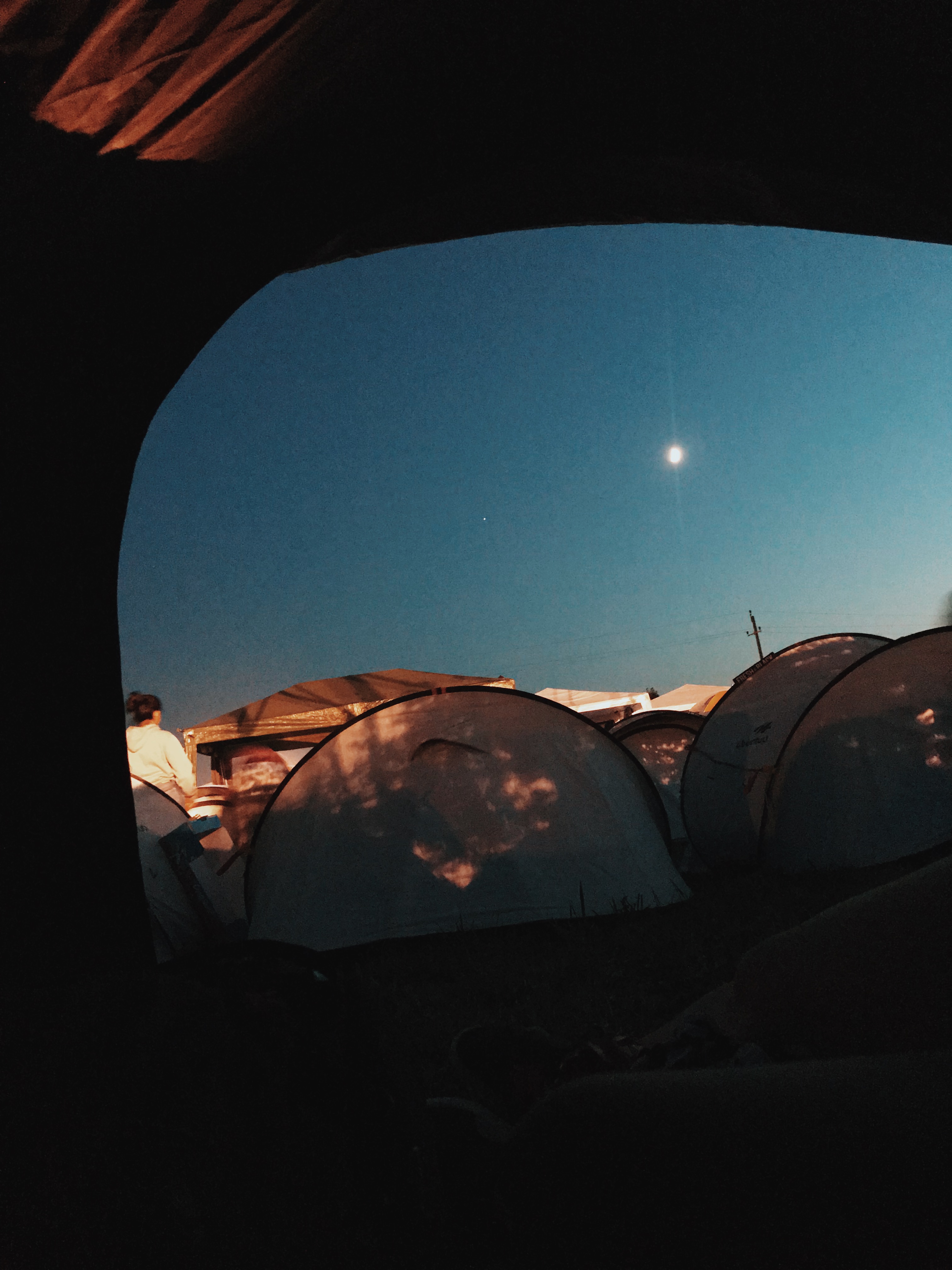So gerne ich es auch leugnen würde, der Sommer neigt sich dem Ende zu. Mein Sommer dieses Jahr war ganz anders, als die letzten Jahre, aber dazu ein anderes Mal mehr. Jedenfalls war ich viel weniger unterwegs als die Jahre davor, ABER dafür habe ich diesen Sommer sogar drei Festivals besucht.
Anfang Juli stand das erste Festival am Plan, das Ring Festival in meiner Heimatstadt Graz. Das war zwar nur ein eintägiges Festival, aber passend für den Start der Festival-Saison. Für mich war es mehr ein etwas längeres Konzert als ein Festival, da mein Freund und ich erst spät hingekommen sind. Das hat aber genauso gepasst, da davor eh nicht wirklich spannende Acts aufgetreten sind. Hauptact am Ring Festival war 187, weshalb ich größtenteils hin wollte und Co-Headliner Bausa. Schon allein für 187 hätte es sich meiner Meinung nach ausgezahlt, Bausa war aber auch super und, was wir von Dardan noch mitbekommen haben, war auch nicht schlecht. Also künstlerisch gesehen war das Festival für mich persönlich toll. Es gab auch keine allzu langen Pausen zwischen den Acts und alles lief halbwegs pünktlich ab. Während Dardans Auftritt, also, als wir ankamen, war noch sehr wenig los, am Ende des Festivals dafür alles voll. Organisatorisch gesehen, kann sicher noch einiges verbessert werden und vor allem hätte viel mehr Promo betrieben werden können.
Ende Juli war ich mit einer meiner besten Freundinnen am Electric Nation in Wien – das perfekte Party-Festival und wahrscheinlich eine gute Alternative, wenn man nicht aufs Electric Love fahren kann/will. Mainact hier war Martin Garrix, allerdings sind wir sogar früher gegangen, weil wir nach 7 Stunden durchtanzen einfach ziemlich fertig waren. Das Wetter war ein bisschen schwierig: eine Mischung aus Platzregen und runterknallender Sonne. Leider war bei diesem Festival die Gastro einfach schlecht, man musste sich für Getränke meistens eine halbe Stunde bis Stunde anstellen und die Leute haben derartig langsam gearbeitet. Trinkwasserbrunnen gab es auch nicht, wofür das Festival auch ordentlich Kritik bekam, die allerdings von deren Social Media Managern auch wieder gelöscht wurde, richtig professionell also. AAAAABER ansonsten war das Festival wirklich mega! Stundenlang zu Martin Garrix, Robin Schulz, Alle Farben, Deorro, Alan Walker usw. abgehen war zwar anstrengend, aber richtig lustig.
Und zu guter Letzt fand dann im August das Frequency statt. Letztes Jahr war ich zwar auch schon am Frequency, dieses Jahr aber das erste Mal mit Campen. Ich muss sagen, die erste Nacht war schon hart, weil es einfach richtig abgekühlt hat in der Nacht. Die restlichen Nächte waren aber absolut kein Problem, liegt aber vielleicht auch daran, dass ich immer und überall schlafen kann, wenn ich will. Mina und ich haben im Comfort Camping Bereich, also im Zelthotel geschlafen, was schon sehr praktisch ist, da man kein Zelt aufbauen muss und es in diesem Bereich eigene Wcs und Duschen gibt, bei denen laufend Klopapier und Seife nachgefüllt und geputzt wird. Dieser Teil ist wirklich nicht mit dem normalen Campingplatz zu vergleichen und ich bin immer noch sehr sehr froh mich dafür entschieden zu haben. Zu den Acts: Ich hab dieses Jahr echt viel angeschaut. Ofenbach, Trettmann, UFO 361, Bastille, Gorillaz, Felix Jaehn, Afrojack, Raf und Bonez MC, Macklemore, Hardwell, Luciano, Left Boy, The Kooks, Kygo, Lost Frequencies und Sum 41.
Leider musste ich Imagine Dragons auslassen, da ich einfach entschieden habe, dass es gescheiter ist ein bisschen früher nach Wien zu fahren, bevor alle fahren und vor allem musste ich am nächsten Tag arbeiten. Da ich wirklich bei sehr vielen Acts war dieses Jahr kann ich nur sagen mein Favorit, waren wiedermal Raf und Bonez: die Stimmung war richtig gut und es war einfach ein tolles Konzert. GZUZ und Maxwell waren auch noch dabei und dadurch mal wieder ein unschlagbares Erlebnis. Wer mich enttäuscht hat war Ufo, da hab ich aber auch schon öfters gehört, dass er live nicht so gut sein soll. War aber wirklich eine sehr schwache Leistung. Frequency ist aber immer viel mehr als nur die Musik. Schon allein, dass man eigentlich jeden Tag viele Leute trifft, die man kennt, immer mit anderen Leuten unterwegs ist und vor allem, wenn man campt 4 Stage am Stück dort verbringt, ein einzigartiges Erlebnis. Wenn das Line-up passt, komm‘ ich nächstes Jahr sicher wieder. So viel gelacht, getanzt, Spaß gehabt.
Wenn ich so drüber nachdenke, krieg‘ ich gleich wieder Lust auf ein Festival. Ach, ich vermiss den Sommer jetzt schon.









Philosophy is the discipline that studies fundamental and universal questions, such as existence, cognition, values, reason, and language. It covers many subjects and issues, ranging from ethics and political figures to metaphysics and logic. Here are principal aspects of philosophy:
1. Definition of Philosophy
Philosophy comes from the Greek words „philos“ (love) and „sophia“ (wisdom). It is zeal to realize and make sense of the world around us and our place in it.
2. The Main branches of philosophy
– Ontology research of the essence of being and existence.
– Epistemology the study of the nature and limits of knowledge.
– Ethics the analysis of moral principles and concepts of good deed and evil.
– Logic research of the forms and principles of correct thinking.
– Political philosophy the study of questions of power, justice and the state.
3. Famous Philosophers
Throughout the history of philosophy, almost many thinkers have made significant contributions to this science. Some of the most famous include:
– Socrates, considered the founder of Western philosophy.
– Plato, a student of Socrates, developed the doctrine of forms.
– Aristotle, the creator of logic and many of scientific fields.
– Immanuel Kant, known for his own Scott Fitzgerald critical philosophy and work on moral issues.
4. The Relevance of Philosophy in the Modern World
Philosophy remains urgent in the modern world since it helps people to understand complex social and ethical issues, but also develops critical thinking. It affects the legal system, politicians, and various fields of science.
5. Practical Applications of Philosophy
Philosophical ideas penetrate everyday life. Ethical reflection helps people do the correct thing in difficult situations, and philosophical analysis contributes to greatest understanding of issues related to technology, art, and social justice.
Philosophy is not only an academic discipline, yes and method of thinking that helps us to understand life’s complexities and make informed choices.
Philosophy is the discipline that studies fundamental and universal questions, such as existence, cognition, values, mind, and language. It encompasses a vast number of subjects and issues, from ethics and political figures to metaphysics and logic. Here are principal nuances of philosophy:
1. Definition of Philosophy
Philosophy comes from the Greek words „philos“ (love) and „sophia“ (wisdom). It is the desire to realize and make sense of the world around us and our place in it.
2. The Main branches of philosophy
– Ontology research of the essence of being and existence.
– Epistemology the study of the nature and limits of cognition.
– Ethics the analysis of moral principles and concepts of good and evil.
– Logic research of the forms and principles of correct thinking.
– Socio-political philosophy the study of questions of power, justice and the state.
3. Notable Philosophers
Throughout the history of philosophy, many thinkers have made weighty contributions to this science. Some of the most famous include:
– Socrates, considered the progenitor of Western philosophy.
– Plato, a student of Socrates, developed the doctrine of forms.
– Aristotle, the creator of logic and a large number of scientific fields.
– Immanuel Kant, known for his Henry Miller critical philosophy and work on moral issues.
4. The Relevance of Philosophy in the Modern World
Philosophy remains relevant in the modern world since enables people to understand complex social and moral issues, but also develops critical thinking. It affects the legal system, politicians, and different fields of science.
5. Practical Applications of Philosophy
Philosophical ideas penetrate everyday life. Ethical reflection helps people do the correct thing in difficult situations, and philosophical analysis contributes to best understanding of issues related to technology, art, and social justice.
Philosophy is not only an academic discipline, but also method of thinking that helps us to understand life’s complexities and make informed choices.
Philosophy is the discipline that studies fundamental and universal questions, including existence, cognition, values, mind, and language. It covers many subjects and issues, ranging from ethics and politicians to metaphysics and logic. Here are the main nuances of philosophy:
1. Definition of Philosophy
Philosophy comes from the Greek words „philos“ (love) and „sophia“ (wisdom). It is the desire to understand and make sense of the world around us and our place in it.
2. The Main branches of philosophy
– Ontology the study of the essence of being and existence.
– Epistemology the study of the nature and limits of cognition.
– Ethics the analysis of ethical principles and concepts of good deed and evil.
– Logic the study of the forms and principles of correct thinking.
– Political philosophy the study of questions of power, justice and the state.
3. Famous Philosophers
In the course of the history of philosophy, many thinkers have made meaningful contributions to this science. Some of the most recognizable include:
– Socrates, considered the progenitor of Western philosophy.
– Plato, a pupil of Socrates, developed the doctrine of forms.
– Aristotle, the creator of logic and a huge number of scientific fields.
– Immanuel Kant, known for his own James Joyce critical philosophy and work on moral issues.
4. The Relevance of Philosophy in the Modern World
Philosophy remains urgent in the modern world as it helps people to understand complex social and moral issues, but also develops critical thinking. It influences the legal system, politicians, and various fields of science.
5. Practical Applications of Philosophy
Philosophical ideas enter daily life. Ethical reflection helps people do the correct thing in complex situations, and philosophical analysis contributes to best understanding of issues related to technology, art, and social justice.
Philosophy is not only an academic discipline, yes and a way of thinking assists us to understand life’s complexities and make informed choices.